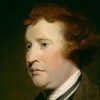“ The poorest man finds his own importance and dignity in it, whilst the wealth and pride of individuals at every moment makes the man of humble rank and fortune sensible of his inferiority and degrades and vilifies his condition. ”
Edmund Burke, Reflections on the Revolution in France (1790). copy citation
| Author | Edmund Burke |
|---|---|
| Source | Reflections on the Revolution in France |
| Topic | importance wealth |
| Date | 1790 |
| Language | English |
| Reference | |
| Note | |
| Weblink | https://en.wikisource.org/wiki/Reflections_on_the_Revolution_in_France |
Context
“For those purposes they think some part of the wealth of the
country is as usefully employed as it can be in fomenting the luxury of
individuals. It is the public ornament. It is the public consolation. It
nourishes the public hope. The poorest man finds his own importance and
dignity in it, whilst the wealth and pride of individuals at every moment
makes the man of humble rank and fortune sensible of his inferiority and
degrades and vilifies his condition. It is for the man in humble life, and
to raise his nature and to put him in mind of a state in which the
privileges of opulence will cease, when he will be equal by nature, and may
be more than equal by virtue, that this portion of the general wealth of”
source


